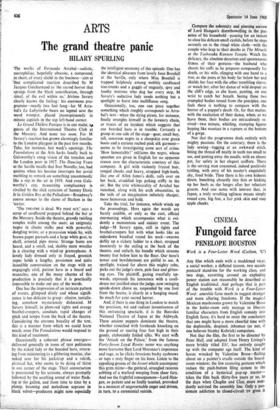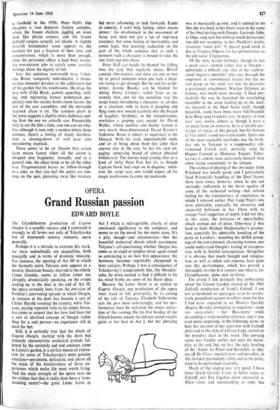Work is a Four-Letter Word (Carlton, `LJ')
.CINEMA
Fungoid farce
PENELOPE. HOUSTON
Any film which ends with a maddened vicar, a social worker, a deflated tycoon, two seaside postcard stand-ins for the working class, and two dogs, cavorting around an exploding power station can reasonably be described as English traditional. And perhaps that is part of the trouble with Work is a Four-Letter Word: anarchic farce needs to suggest stranger and more alluring freedoms. If the magical Mexican mushrooms grown by Valentine Brose in the boiler-room only manage to liberate familiar characters from English comedy into English farce, it's hard to resist the conclusion that one might have a more cheerful time with the deplorable, despised, inhuman (or not, if one believes Stanley Kubrick) computers.
Not that the film, the first to be directed by Peter Hall, and adapted from Henry Livings's more briskly titled Eh?, has entirely caught up with the computer age itself. The kind of havoc wreaked by Valentine Brose—flailing about on a painter's cradle outside the board- room window; the few caressing gestures which reduce the push-button filing system to the condition of a hysterical pop-up toaster— takes the film back thirty-five years or so, to the days when Chaplin and Clair more mor- dantly satirised the assembly line. Only a pas- sionate addiction to closed-circuit Tv gives it
a foothold in the 1970s. Peter Hall's film imagines a vast domestic factory complex, where the frozen chickens jiggling on wires look like plastic corpses, and the frozen daffodil corpses actually are plastic. A slightly feverish loudspeaker voice appeals to the workers for just a fraction of their time and concentration; which is more than enough, since the personnel officer is kept busy invent- ing non-existent jobs to satisfy some atavistic feelings about the dignity of toil.
Into this nebulous non-world stray Valen- tine Brose, rampantly individualist, a mono- maniac innocent devoted to the cultivation not of his garden but his mushrooms. He drags his new wife (Cilia Black, gamely squealing, smil- ing, and registering honest proletarian per- plexity) into his steamy boiler-room haven; the rest of the cast assembles; and the inevitable slapstick chase is •on. The synopsis given to the press suggests a slightly more elaborate end- ing than the one we actually saw. Presumably they've cut the film a little, and one can see why. For although it runs only a modest ninety-three minutes, there's a feeling of steady decelera- tion, a slowing-down of real pace into meandering slapstick.
There seems to be an illusion that screen farce moves fastest when all the action is chopped into fragments. Actually, and as a general rule, the effect tends to be all the other way. Fragmentation leaves no follow-through to a joke, so that you feel the actors are run- ning on the spot, pistoning away like maniacs
but never advancing an inch forwards. Faster in comedy, I can't help feeling, often means slower: for involvement in the movement of farce, you need not just a lot of snip-snap craziness, but some feeling of inevitability and comic logic, that dawning realisation on the part of the whole audience that at such a moment such a character is bound to take the one fatal step into chaos.
Peter Hall can hardly be blamed for falling into the trap that regularly snares British comedy film-makers; and there are one or two sly or genial moments when one feels a direc- tor trying to get through. But he and his script- writer, Jeremy Brooks, can be blamed for slicing Henry Livings's verbal farce so ex- tremely thin, and for the snatching way the script keeps introducing a character, or an idea or a situation, only to leave it dangling and fling some new instant eccentric into the breach of laughter. Stridency, in the circumstances, overtakes a gasping cast; except for David Waller, whose luckless and barmy tycoon is very nearly three-dimensional. David Warner's Valentine Brose is almost as equivocal as his Morgan. With his tired, imperturbable smile and air of being about three feet taller than anyone else in the cast, he has his own en- gaging, unnerving brand of almost physical withdrawal. The movies keep casting him as a kind of shifty Peter Pan, but it's as though Captain Hook had crept on in disguise: what- ever the script says, one would expect all his magic mushrooms to come up toadstools.











































 Previous page
Previous page